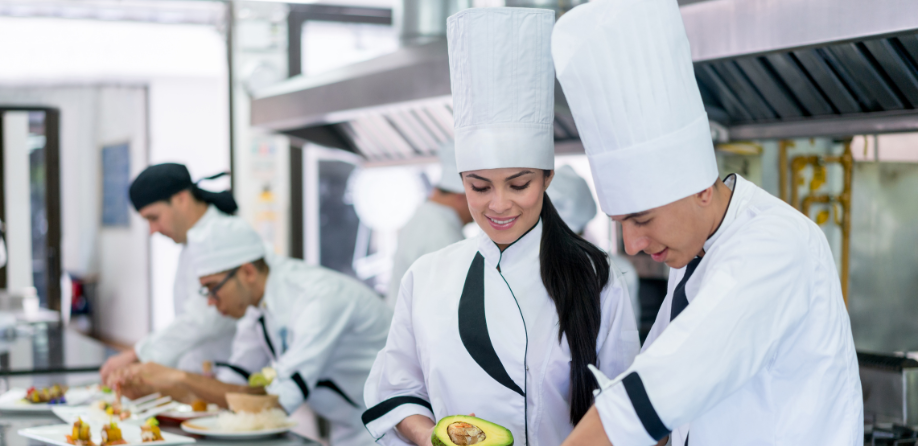Qualifications in the Hospitality Industry
.png)
There are several professional qualifications available for hospitality staff, including:
Food Hygiene and Safety Certification: This certification is essential for all hospitality staff involved in food preparation and handling. The training covers topics like safe food storage, handling, and preparation, preventing contamination, and personal hygiene.
Beverage Service Certification: This certification is for staff who work in bars, restaurants, and other establishments that serve alcohol. The training covers topics like responsible alcohol service, drink mixing, and customer service.
Hotel Management Certification: This certification is for staff who work in hotel management and covers topics like hotel operations, marketing, financial management, and customer service.
Event Planning Certification: This certification is for staff involved in event planning and covers topics like event design, planning, coordination, and management.
Customer Service Certification: This certification is for staff who interact with customers directly and covers topics like communication skills, problem-solving, and conflict resolution.
Culinary Arts Certification: This certification is for staff who work in the kitchen and covers topics like cooking techniques, food presentation, menu planning, and food safety.
Front Desk Certification: This certification is for staff who work at the front desk of a hotel or other establishment and covers topics like customer service, communication, and computer skills.
These certifications can help hospitality staff improve their skills, knowledge, and job prospects. They are often offered by professional organizations, trade associations, and educational institutions.
Awarding Bodies
In the UK, professional qualifications for hospitality staff are awarded by various industry bodies and educational institutions. Here are some examples:
Food Hygiene and Safety Certification: This certification is awarded by several organizations, including the Chartered Institute of Environmental Health (CIEH), the Royal Society for Public Health (RSPH), and Highfield Qualifications.
Beverage Service Certification: The Wine & Spirit Education Trust (WSET) offers various beverage service qualifications, including the Level 1 Award in Wine Service and the Level 2 Award in Spirits.
Hotel Management Certification: The Institute of Hospitality offers various qualifications in hotel management, including the Level 3 Diploma in Hospitality and the Level 4 Diploma in Hospitality Management.
Event Planning Certification: The Event Academy offers various qualifications in event planning, including the Level 3 Diploma in Event Management and the Level 4 Certificate in Event Management.
Customer Service Certification: The Institute of Customer Service offers various qualifications in customer service, including the Level 2 Certificate in Customer Service and the Level 3 Diploma in Customer Service.
Culinary Arts Certification: The City and Guilds of London Institute offers various culinary arts qualifications, including the Level 2 Diploma in Professional Cookery and the Level 3 Advanced Technical Diploma in Patisserie and Confectionery.
Front Desk Certification: The Institute of Hospitality offers the Level 2 Award in Reception and Front Office Skills, which covers topics like customer service, communication, and computer skills.
These qualifications may be delivered by training providers, colleges, and universities across the UK. It is important to research and choose a reputable provider that meets your needs and aspirations.
Apprenticeships
Many of these qualifications for hospitality staff are available as apprenticeships in the UK. Apprenticeships are work-based training programmes that allow individuals to learn practical skills and gain qualifications while earning a wage.
The UK government has developed a range of apprenticeship standards for different job roles in the hospitality industry. These standards are developed by employers and industry bodies and set out the knowledge, skills, and behaviours that apprentices should develop during their training.
Some examples of hospitality apprenticeships available in the UK include:
Hospitality Team Member: This apprenticeship covers the basic skills and knowledge needed to work in a hospitality setting, such as customer service, food and beverage service, and teamwork.
Hospitality Supervisor: This apprenticeship is aimed at individuals who are in a supervisory role in a hospitality setting, such as a shift leader or team leader. The training covers topics like leadership, communication, and customer service.
Chef: This apprenticeship is for individuals who want to train as a professional chef. The training covers topics like food preparation and cooking techniques, kitchen management, and health and safety.
Hotel Manager: This apprenticeship is for individuals who want to train as a hotel manager. The training covers topics like financial management, marketing, customer service, and leadership.
Events Assistant: This apprenticeship is for individuals who want to work in event planning and management. The training covers topics like event design, planning, coordination, and customer service.
Apprenticeships are available at different levels, from Level 2 (equivalent to GCSEs) to Level 7 (equivalent to a master's degree). The level of apprenticeship you choose will depend on your existing qualifications and experience, as well as your career aspirations.
In the UK, you can start a hospitality apprenticeship immediately after leaving school if you are aged 16 or over and not in full-time education. Apprenticeships are a great way to gain practical skills, work experience, and qualifications while earning a wage.
To start an apprenticeship, you will need to find an employer who is willing to take you on as an apprentice. You can search for apprenticeship vacancies on the government's Find an Apprenticeship website or through other job search websites.
Once you have found an employer, you will need to apply for the apprenticeship and meet the entry requirements, which vary depending on the level of the apprenticeship. For example, to start a Level 2 Hospitality Team Member apprenticeship, you will usually need to have a minimum of grade 3 (or grade D) in English and maths at GCSE level.
If you do not meet the entry requirements, you may be able to take a functional skills qualification in English and/or maths alongside your apprenticeship training.
It is worth noting that some apprenticeships may have additional requirements, such as previous work experience or specific skills. You should check the apprenticeship standard or speak to the employer or training provider for more information.
Culinary Schools
There are culinary schools in the UK that offer professional training in cooking and culinary arts. These schools offer a range of courses and programmes that cover different aspects of cooking, such as classical cuisine, pastry and baking, and modern gastronomy.
Here are some examples of culinary schools in the UK:
Le Cordon Bleu London: Le Cordon Bleu is a renowned culinary school with campuses around the world, including one in London. The school offers a range of diploma and certificate programmes in culinary arts, pastry and baking, and wine and spirits.
Westminster Kingsway College: Westminster Kingsway College is a further education college in London that offers a range of culinary courses, from Level 1 certificates to Level 3 diplomas. The college has state-of-the-art facilities, including a professional training kitchen and a restaurant that is open to the public.
Ashburton Cookery School: Ashburton Cookery School is located in Devon and offers a range of short courses and longer diploma programmes in cooking and pastry. The school's courses are designed for both amateur cooks and professionals who want to improve their skills.
Tante Marie Culinary Academy: Tante Marie is a culinary academy based in Surrey that offers a range of diploma and certificate programmes in cooking and pastry. The academy is known for its intensive training programmes that are designed to prepare students for a career in the culinary industry.
Edinburgh School of Food and Wine: The Edinburgh School of Food and Wine is a culinary school in Scotland that offers a range of courses and programmes in cooking, wine, and hospitality. The school's courses are designed to be hands-on and practical, with a focus on using locally sourced and seasonal ingredients.
These are just a few examples of culinary schools in the UK, and there are many others to choose from. When choosing a culinary school, it is important to consider factors such as the school's reputation, the quality of its facilities and teaching staff, and the cost of the programmes.
Attending culinary school can be a great way to start your career as a chef and increase your job prospects. Culinary schools offer comprehensive training in cooking and culinary arts, providing students with the skills, knowledge, and experience they need to succeed in the culinary industry.
Attending culinary school can also help you to build a network of contacts in the industry, including instructors, fellow students, and industry professionals who may be able to help you find job opportunities and advance your career.
In addition, many culinary schools offer job placement assistance to their graduates, helping them to find employment in restaurants, hotels, catering companies, and other food-related businesses. This can be especially helpful for students who are just starting their careers and may not have a lot of industry connections.
However, attending culinary school is not the only way to become a chef or increase your job prospects in the culinary industry. There are many successful chefs who have worked their way up from entry-level positions in restaurants, gaining experience and knowledge on the job.
Ultimately, the best approach to starting your career as a chef and increasing your job prospects will depend on your individual goals, interests, and circumstances. If you are passionate about cooking and want to pursue a career in the culinary industry, attending culinary school can be a great way to get started.


